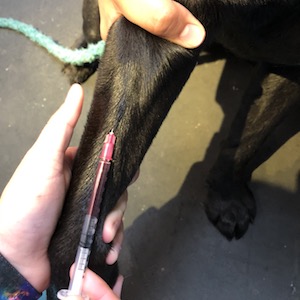Heartworm disease in dogs can be determined through symptoms such as coughing, fatigue, weight loss, and difficulty breathing. Regular testing and preventive medication are vital for early detection and treatment.
Protecting your dog against heartworms is crucial for their overall health and well-being. Heartworm disease is a serious and potentially fatal condition that affects dogs. The disease is caused by parasitic worms that are transmitted through mosquito bites. Once infected, the worms can cause serious damage to the heart, lungs, and blood vessels.
It is essential to stay vigilant for any signs of heartworm disease and take preventive measures to keep your dog safe. Regular testing and preventive medication are the best ways to ensure your dog’s health. We will discuss the signs and symptoms of heartworm disease in dogs, as well as the importance of preventive measures and regular testing.
Understanding Heartworm Disease
Heartworm disease is a serious and potentially fatal condition that affects dogs. The lifecycle of heartworms begins when an infected mosquito bites a dog, transmitting the heartworm larvae into the bloodstream. Once inside the dog, the larvae mature into adult heartworms, residing in the heart and pulmonary arteries. Dogs living in areas where mosquitoes are prevalent are at higher risk for heartworm infection. Other risk factors for heartworm disease include not administering preventive medication, outdoor exposure, and presence of wildlife carrying infected mosquitoes.
Recognizing Heartworm Symptoms
Heartworm disease in dogs can be a serious and potentially fatal condition if left untreated. Recognizing the early stage symptoms of heartworm infection is crucial, as they are often subtle and easily overlooked. These symptoms may include mild coughing, reluctance to exercise, and fatigue. As the infection progresses, moderate signs may become more noticeable, with symptoms such as weight loss, difficulty breathing, and a decreased appetite. In the advanced stages of heartworm disease, critical indicators may manifest, including a swollen abdomen, pale gums, and even heart failure. Regular veterinary check-ups and preventive measures are essential in detecting and managing heartworm infection in dogs.
Subtle Changes Signal Early Infection
Recognizing the early signs of heartworm infection in dogs is crucial for timely intervention. One of the initial indications is a decreased appetite and weight loss. Moreover, dogs may exhibit a mild persistent cough and a decreased desire to exercise. These subtle changes signal the early stages of heartworm infection and should prompt pet owners to seek veterinary care promptly.
Moderate To Severe Heartworm Disease Indicators
Detecting moderate to severe heartworm disease in dogs includes signs like coughing, difficulty breathing, fatigue, and weight loss. Other indicators may involve decreased appetite, swollen abdomen, and fainting spells. If your dog exhibits any of these symptoms, consult a veterinarian promptly for professional evaluation and treatment.
| Moderate to Severe Heartworm Disease Indicators |
|---|
| Noticing fatigue in your dog after moderate activity can be a potential indicator of moderate to severe heartworm disease. This can be a sign that the heart and lungs are not functioning as they should. |
| Another sign to watch out for is trouble breathing or fast breathing. If your dog seems to be struggling for breath or panting excessively, it could be a symptom of heartworm disease progressing to a severe stage. |
| A bulging chest can be a visible sign of a severe heartworm infection. This can occur due to fluid accumulation in the chest, a condition known as pleural effusion, and should be addressed promptly by a veterinarian. |
Organ Damage And Failure Signs
Heartworms in dogs can lead to organ damage and failure. You may notice abnormal lung sounds and a heart murmur when your dog is affected. Additionally, fainting or collapsing can also be a sign of heartworms. Another symptom to watch out for is a swollen belly due to excess fluid. It’s important to be vigilant and look for these signs as they could indicate the presence of heartworm disease.
Diagnosing Heartworm Infection
Diagnosing Heartworm Infection: Blood tests play a crucial role in detecting heartworms in dogs. They are essential for identifying the presence of antigens produced by adult female heartworms. Imaging tests, such as X-rays and ultrasounds, are also used to assess the severity of the infection and detect heartworms in the lungs and heart. Veterinarians confirm the presence of heartworms through a combination of these diagnostic tests, which help in determining the appropriate treatment plan for infected dogs.
Treatment And Management Of Heartworms
When a dog is diagnosed with heartworms, treatment and management become crucial. The standard approach involves using medication to kill the adult worms and managing symptoms. Exercise restriction is important during treatment to prevent complications such as blood clotting. Monitoring the dog’s condition through regular check-ups and post-treatment follow-up care is necessary to ensure the complete eradication of heartworms and to address any residual health issues.
Preventing Heartworm Disease In Dogs
Heartworm disease is a serious and potentially fatal condition. Preventing the disease in dogs is crucial. Prophylactic medications, including oral, topical, and injectable options, are effective in preventing heartworm infection. Additionally, effective mosquito control and prevention strategies can reduce the risk of heartworm transmission. Regular testing and vet visits are also vital preventive measures to ensure early detection and treatment if necessary.

Credit: www.heartwormsociety.org
Frequently Asked Questions Of How Do You Know If Your Dog Has Heartworms
What Are The Common Symptoms Of Heartworm In Dogs?
Heartworm symptoms may include coughing, fatigue, weight loss, and difficulty breathing. Regular check-ups with a veterinarian can help monitor your dog’s health and address potential heartworm concerns.
How Is Heartworm Diagnosed In Dogs?
Through blood tests, veterinarians can detect heartworm proteins and assess the severity of the infection. Early detection is crucial for effective treatment and management of heartworm disease in dogs.
Can Heartworm In Dogs Be Prevented?
Preventive measures such as monthly medications or injections are available to protect dogs from heartworm. Consult with your veterinarian to determine the most suitable prevention approach for your pet.
Conclusion
Don’t overlook the subtle signs of heartworms in your beloved furry friend. Early detection is key to their well-being. Regular check-ups and preventive measures can significantly reduce the risk. Stay alert to any unusual symptoms and consult your veterinarian promptly.
Your proactive care can make all the difference for your dog’s health and happiness.



